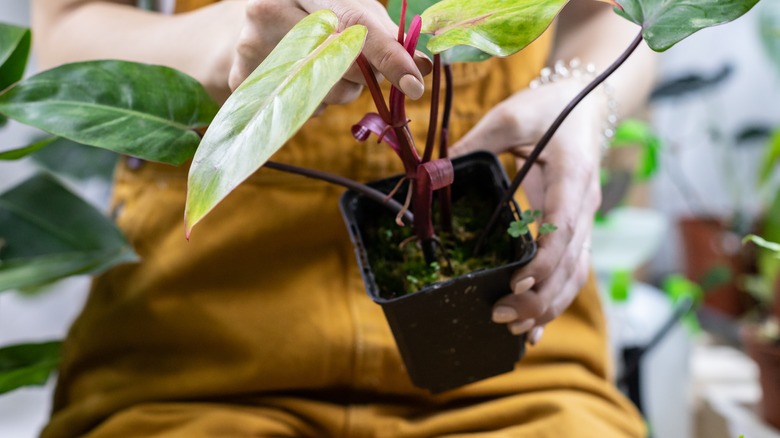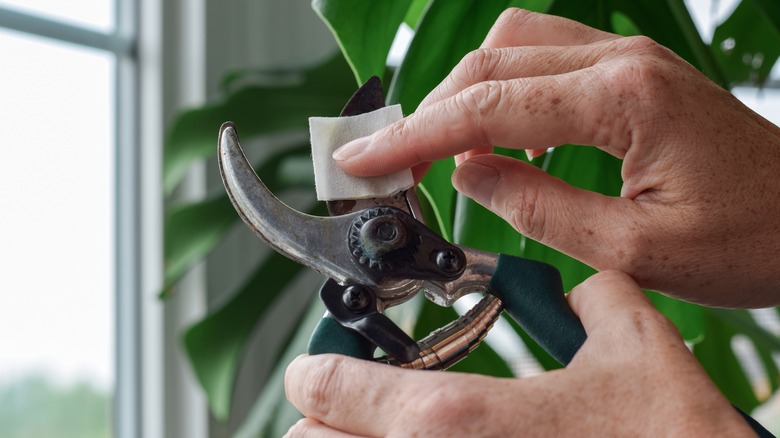What To Do If Weeds Pop Up Around Your Houseplants
For the plant enthusiast, managing weeds in an outdoor garden can seem like a part-time job, particularly during the height of summer when most growth takes off. When it comes to indoor houseplants, one would assume these green friends are immune to weeds as they're safe from the outdoors. Surprise! Your houseplants are also susceptible to weed growth. Indoor plants may inadvertently harbor weeds due to a variety of factors, primarily stemming from the potting soil and external environments. One contributing factor is the composition of potting mixes. Many commercially available mixes contain organic matter, such as peat moss or bark, which may carry weed seeds. These seeds can be introduced during the manufacturing process or may be present in the components used. As a result, when these mixes are used for houseplants, the dormant weed seeds may sprout over time. Fortunately, there are a number of ways to mitigate these issues, such as manually pulling the weeds and developing proper potting habits.
Additionally, there are other precautions you can take to discourage weeds from putting down roots in your houseplants. For example, if you move any of your plants outside during warmer weather, the likelihood of them coming into contact with airborne seeds increases exponentially. Ultimately, failing to treat the growth of weeds in the houseplants that live both inside and outside can allow them to spread to your other plants. Fortunately, there are several methods you can practice to solve these issues.
How to manage weeds in your houseplants
If you've noticed weeds popping up in your indoor planters, immediate action should be taken to manage their growth and prevent their spread to your other plants. First, manually remove visible weeds, ensuring to pull them out at the root to prevent regrowth. Regularly inspect the soil surface and promptly address any emerging weeds. Applying a layer of organic mulch, such as wood chips or straw, serves as a protective barrier, impeding weed germination by blocking their sunlight and conserving soil moisture. Incorporating these practices into a routine maintenance schedule helps address weed issues on a timely basis.
For long-term weed management, preventive measures are crucial. Begin by using high-quality weed-free potting mixes to minimize the introduction of weed seeds. Low-quality potting soils have a higher chance of contamination and may already contain weed seeds. When not using potting soil, it's best to store it in an airtight container in a cool, dry place. Improper storage can lead to contamination, especially if the soil is stored outside or in a shed where exposure to airborne seeds is higher.
Finally, purchasing a bottle of neem oil is great for getting rid of weeds, as well as fungus and common pests for your indoor plants. Neem oil is an all-natural product that is available at most nurseries and online. Applying neem oil to your indoor plants is a safe way to kill weeds and deter them from regrowing or spreading among your houseplants.
Gardening practices to prevent weeds in your houseplants
Proper care for indoor plants is essential to prevent weed growth and ensure the well-being of your green companions. It's good habit to clean gardening tools between each use. This practice can help to minimize the risk of introducing weed seeds into your indoor environment. Soil, debris, or remnants from outdoor gardening activities can inadvertently transport weed seeds. Regularly cleaning and sterilizing tools, such as pruners and trowels, before using them on indoor plants helps maintain a weed-free environment.
Moreover, cleaning planters between uses is another critical aspect of indoor plant care. Reusing planters without proper cleaning may introduce weed seeds or pathogens that could compromise the health of your houseplants. Thoroughly wash planters with hot, soapy water, followed by a disinfecting soak. One-part household bleach to nine parts water is a good formula for a disinfecting soak.
Finally, removing debris from indoor plants' soil is a proactive measure to prevent weed growth. Fallen leaves, spent flowers, or any organic matter on the soil surface can provide an ideal environment for weed seeds to germinate. Regularly inspect and clean the surface, removing any debris that may accumulate. This not only reduces the risk of weed growth but also promotes better air circulation and prevents potential pest or disease issues. By diligently incorporating these practices into your indoor plant care routine, you create a clean and controlled environment that significantly mitigates the risk of weed germination.

